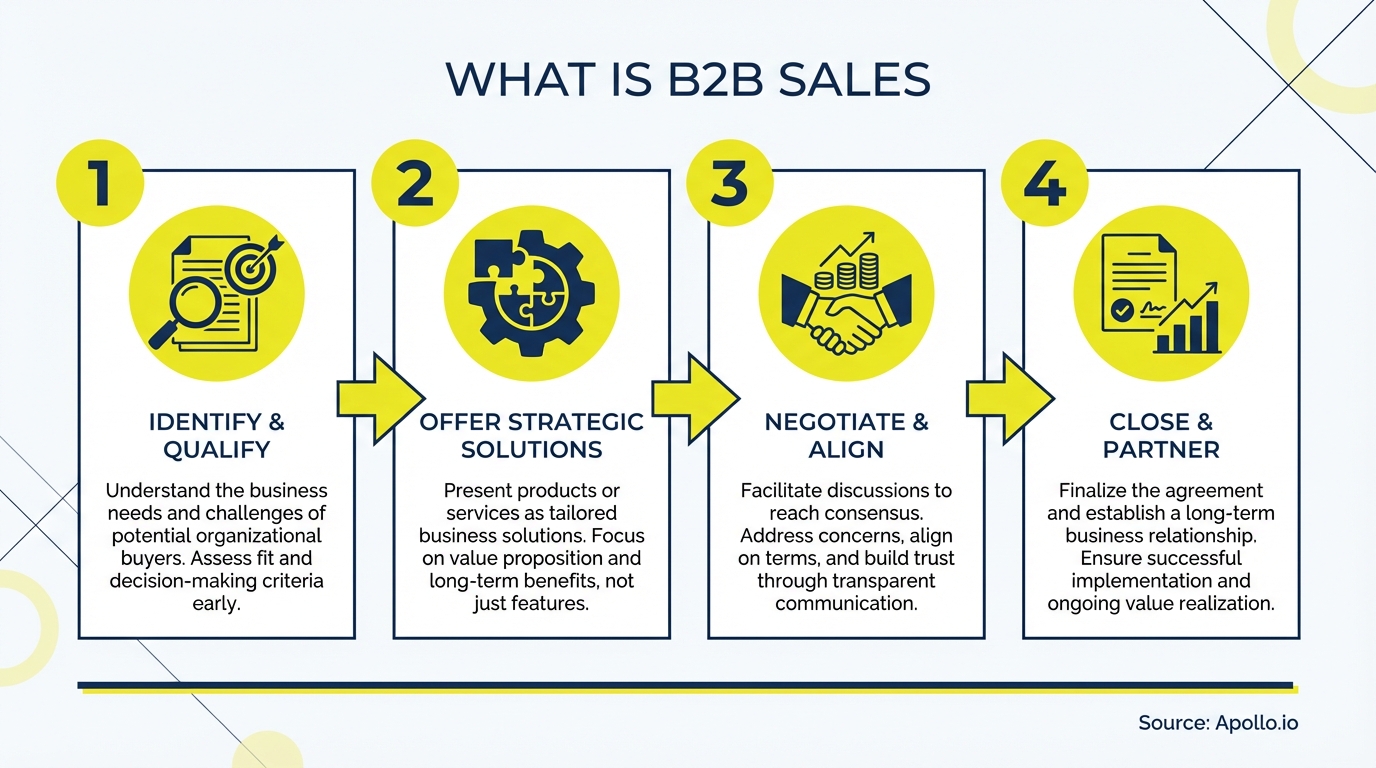What Is B2B Sales? Definition, Process, and 2026 Playbook

What Is B2B Sales? Definition, Process, and 2026 Playbook
B2B sales (business-to-business sales) is the process of selling products or services from one business to another. Unlike B2C transactions, B2B sales involve longer cycles, multiple decision-makers, and higher transaction values.
In 2026, B2B sales has evolved into a buyer-led discipline where 61% of buyers prefer rep-free experiences, pushing sales teams to become enablers rather than persuaders.
The stakes are high: Sword and the Script reports the median B2B sales cycle "ballooned" from 120 to 408 days. Success now requires AI-assisted workflows, data-driven targeting, and consensus-building content that reduces friction at every stage.

Skip Manual Research - Apollo Finds Contacts Fast
Tired of spending 4+ hours daily hunting for contact info? Apollo delivers 224M verified contacts with 96% email accuracy. Join 550K+ companies closing more deals.
Start Free with Apollo →Key Takeaways
- B2B sales is shifting from rep-led persuasion to buyer-enabled decision-making with self-serve and digital-first journeys
- Modern B2B selling requires orchestrating humans, AI agents, and digital touchpoints as an integrated system
- According to BookYourData, 80% of B2B sales interactions now occur through digital channels
- AI adoption is mainstream: sales teams using AI report revenue growth rates of 83% vs 66% for non-AI teams
- Sales governance and message consistency are critical: 69% of buyers report inconsistencies between vendor websites and seller messaging
What Is B2B Sales in 2026?
B2B sales is the commercial process of selling products, services, or solutions to other businesses. It involves identifying target accounts, engaging buying committees, navigating complex approval processes, and closing deals that typically range from thousands to millions of dollars.
What defines B2B sales today is buyer autonomy. Research shows buyers complete 70% of their journey before engaging a rep. They want self-serve resources, peer validation, and AI-powered tools that let them research, compare, and decide on their timeline.
"Apollo enriches everything we have: contacts, leads, accounts... And we don't really have to touch it, it just works."
The modern B2B sales motion combines three elements: prospecting intelligence to identify high-intent accounts, engagement automation to scale personalized outreach, and enablement content that empowers buyers to sell internally. Teams that master this trio close faster and win more. Learn proven B2B sales techniques that drive measurable ROI.
How Is B2B Sales Different From B2C Sales?
| Factor | B2B Sales | B2C Sales |
|---|---|---|
| Decision-Makers | 5-11 stakeholders per deal | Single buyer or household |
| Sales Cycle | 4-14 months average | Minutes to days |
| Transaction Value | $10K-$1M+ typical | $10-$1K typical |
| Purchase Logic | ROI, risk mitigation, consensus | Emotion, convenience, price |
| Relationship Duration | Multi-year partnerships | Transactional or loyalty-based |
B2B buyers demand proof: case studies, ROI calculators, technical documentation, and security certifications. They evaluate vendors across functional fit, financial risk, implementation complexity, and vendor stability. High-ticket B2B sales require specialized techniques to navigate these complexities.
What Is the B2B Sales Process?
The B2B sales process is a structured framework for moving prospects from awareness to closed-won. While specific stages vary by industry, the core workflow remains consistent:
1. Prospecting and Lead Generation
Identify target accounts using firmographic filters (company size, industry, revenue), technographic data (tech stack), and intent signals (content engagement, hiring patterns). The goal is to build a qualified pipeline of companies matching your ideal customer profile.
Struggling to find qualified leads? Search Apollo's 224M+ contacts with 65+ filters to build your pipeline in minutes.
2. Initial Outreach and Qualification
Engage prospects through multi-channel sequences: email, phone, and social outreach. Use discovery questions to confirm budget, authority, need, and timeline (BANT).
Qualify hard: only 20-30% of leads should progress past this stage.
3. Needs Analysis and Solution Mapping
Conduct deep discovery to understand business challenges, current workflows, success metrics, and stakeholder priorities. Map your solution to their specific pain points with quantified outcomes.
4. Proposal and Commercial Negotiation
Present a formal proposal with pricing, implementation timeline, success criteria, and support commitments. Negotiate terms while protecting margins and ensuring mutual success.
5. Consensus-Building and Close
Enable champions to sell internally with stakeholder packs, ROI justification, and risk mitigation content. Address objections from finance, legal, IT, and end-users.
Close with clear next steps and mutual action plans.
According to Marketing LTB, the average B2B sales cycle has increased to 4.9 months. Shortening cycles requires removing friction at every stage. Optimize your B2B sales funnel to accelerate velocity.

What Role Does AI Play in Modern B2B Sales?
AI has moved from experimentation to operational necessity. Sales teams use AI for prospecting automation, personalized content generation, conversation intelligence, and predictive forecasting.
The impact is measurable: teams using AI report 83% revenue growth vs 66% for non-AI teams.
Practical AI applications in B2B sales include:
- Lead Scoring: AI models predict conversion likelihood based on engagement patterns, firmographics, and historical win data
- Message Personalization: AI generates tailored emails and sequences at scale while maintaining brand voice
- Call Intelligence: AI transcribes calls, extracts action items, and identifies objection patterns
- Pipeline Forecasting: AI analyzes deal velocity, engagement signals, and historical patterns to predict close probability
"With this kind of AI system, my BDRs can send 10x more personalized emails. Their productivity and growth has skyrocketed."
The key is governance: AI must work within approved messaging frameworks, cite verifiable claims, and maintain data security. Ungoverned AI risks brand damage and buyer distrust.
Turn Forecast Chaos Into Revenue Certainty
Struggling with unreliable pipeline visibility? Apollo delivers real-time deal intelligence and automated lead qualification so you can forecast with confidence. Built-In increased win rates 10% using Apollo's scoring and signals.
Start Free with Apollo →What Are the Biggest B2B Sales Challenges in 2026?
B2B sales teams face three systemic challenges that impact win rates and cycle times:
1. Buyer Preference for Self-Service
61% of B2B buyers prefer rep-free buying experiences. Sellers must provide digital-first resources: interactive demos, self-serve pricing, peer reviews, and implementation calculators.
The rep's role shifts to validation and consensus-building.
2. Deal Stalls and Buying Committee Paralysis
86% of B2B purchases stall during the buying process. Common causes include unclear ROI, internal misalignment, competing priorities, and risk aversion.
Prevention requires mutual action plans, stakeholder mapping, and change management content.
3. Message Inconsistency Across Channels
69% of buyers report inconsistencies between vendor websites and seller messaging. This destroys trust and creates deal risk.
Solution: implement content governance with single-source-of-truth documentation, approved claim libraries, and cross-functional review workflows.
Spending hours on manual outreach? Automate your sequences with Apollo's AI-powered engagement platform.
What Tools Do B2B Sales Teams Need?
Modern B2B sales requires an integrated tech stack that consolidates prospecting, engagement, and execution into one workspace. Teams using fragmented tools waste hours on data entry, context-switching, and manual workflows.
Essential capabilities include:
- B2B Database: Access to verified contacts with direct dials, validated emails, and org charts
- Sales Engagement: Multi-channel sequences with email, phone, and social outreach automation
- Data Enrichment: Automatic contact and account updates to maintain data freshness
- Conversation Intelligence: Call recording, transcription, and AI-powered insights
- Deal Management: Pipeline tracking with stage-based workflows and forecasting
According to The B2B Mix, 48% of companies now have a Revenue Operations (RevOps) function. RevOps teams standardize processes, consolidate tools, and align sales, marketing, and customer success around unified metrics. Enterprise sales solutions must support this integrated approach.
How to Get Started With B2B Sales
Launch a B2B sales motion in four steps:
Step 1: Define Your Ideal Customer Profile (ICP). Specify firmographics (company size, revenue, industry), technographics (tech stack), and behavioral signals (hiring, funding, expansion).
Use historical win data to validate assumptions.
Step 2: Build Your Prospecting System. Select a B2B database with verified contacts, implement lead scoring to prioritize high-intent accounts, and create multi-channel sequences that respect buyer preferences. Intent data helps you reach buyers at the right time.
Step 3: Create Enablement Content. Develop customer-facing assets that enable self-serve decisions: case studies, ROI calculators, implementation guides, security documentation, and comparison sheets.
Map content to each buying stage.
Step 4: Implement Governance and Measurement. Establish message consistency standards, approved claim libraries, and cross-functional review processes. Track leading indicators: meetings booked, pipeline created, deal velocity, and win rate by segment. Sales analytics reveal what's working and what needs adjustment.
Start Building Your B2B Sales System
B2B sales in 2026 requires a system-first approach: AI-assisted prospecting, buyer-enabled journeys, and governance frameworks that maintain trust at scale. The winners will be teams that consolidate tools, automate busywork, and focus human expertise on high-value activities like consensus-building and strategic advisory.
Apollo provides the all-in-one platform to prospect, engage, and close deals faster. With 224M+ verified contacts, AI-powered sequences, and integrated deal management, teams reduce tool complexity while accelerating results.
Start Free with Apollo and transform how your team sells.
Prove Apollo's ROI In Your First 30 Days
Budget approval stuck on unclear metrics? Apollo tracks every touchpoint from first contact to closed deal—quantifying time saved, pipeline added, and win rate lift. Built-In increased win rates 10% and ACV 10% using Apollo's signals.
Start Free with Apollo →
Cam Thompson
Search & Paid | Apollo.io Insights
Cameron Thompson leads paid acquisition at Apollo.io, where he’s focused on scaling B2B growth through paid search, social, and performance marketing. With past roles at Novo, Greenlight, and Kabbage, he’s been in the trenches building growth engines that actually drive results. Outside the ad platforms, you’ll find him geeking out over conversion rates, Atlanta eats, and dad jokes.
Don't miss these
Sales
Inbound vs Outbound Marketing: Which Strategy Wins?
Sales
What Is a Sales Funnel? The Non-Linear Revenue Framework for 2026
Sales
What Is a Go-to-Market Strategy? The Data-Driven Blueprint That Actually Works
See Apollo in action
We'd love to show how Apollo can help you sell better.
By submitting this form, you will receive information, tips, and promotions from Apollo. To learn more, see our Privacy Statement.
4.7/5 based on 9,015 reviews
